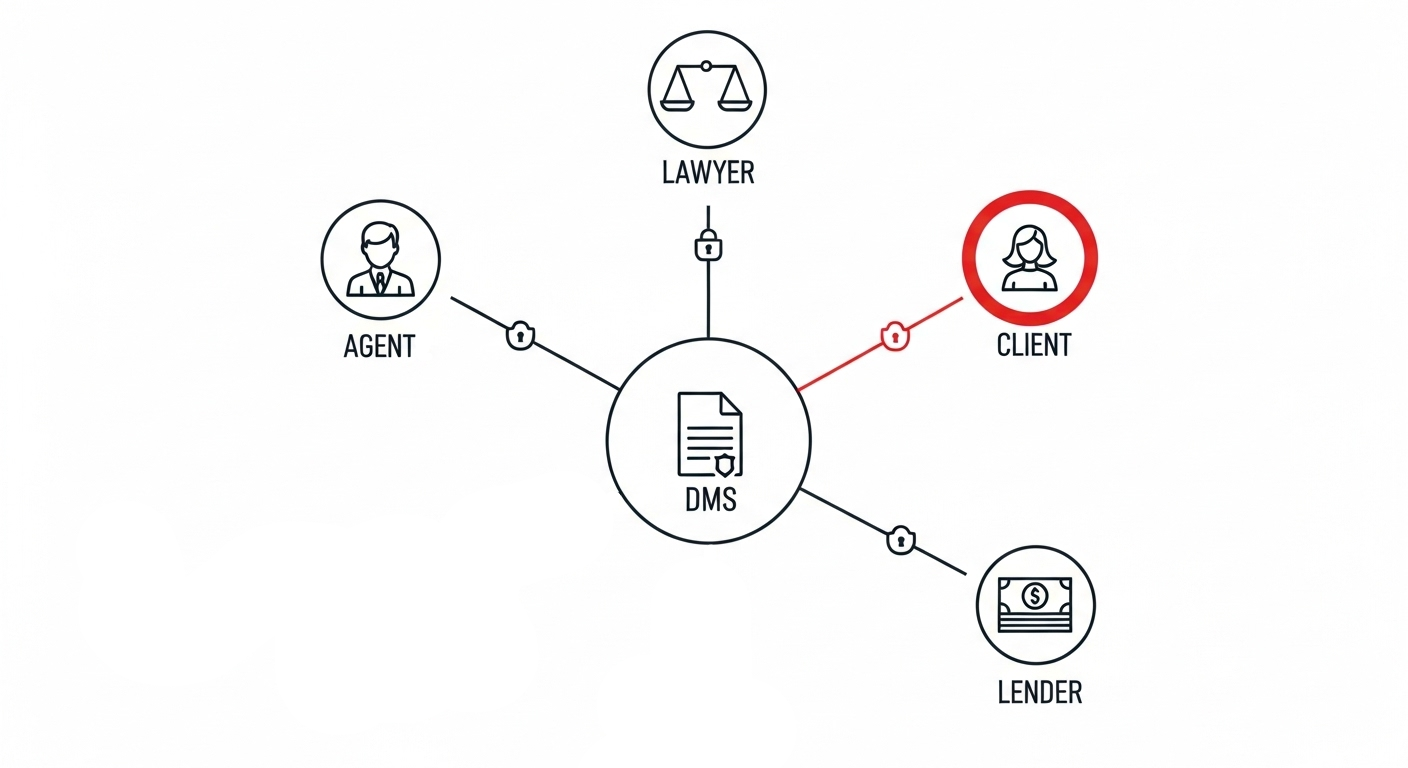Your client's financial information sits in an unsecured email thread while you scramble to find the right document, meanwhile the closing falls through because an important disclosure form was never signed.
This isn't a rare headache; the National Association of Realtors reports that nearly a quarter of all real estate closings are delayed, often due to simple paperwork errors and missed deadlines.
That’s why you should consider integrating a Document Management System (DMS) into your transaction pipeline.
Why Your Real Estate Agency Needs a DMS

A Document Management System (DMS) is software that organizes, secures, and controls all your real estate documents. It handles everything from listing agreements and purchase contracts to inspection reports and closing documents.
You might also encounter ECM (Enterprise Content Management), which manages broader content types throughout their entire lifecycle.
For real estate agencies, both serve the same essential purpose: making sure that the right document reaches the right person on time, whenever they need it.
The real estate industry suffers from a lack of uniform document standards, which complicates the processing of the many documents that accompany every transaction. When you're managing multiple deals simultaneously, document disorganization is both inconvenient and dangerous.
Why Real Estate Agents Should Prioritize Security and Compliance
Real estate agents are responsible for protecting highly sensitive information such as Social Security numbers, bank statements, tax returns, and transaction details worth hundreds of thousands of dollars.
New regulations like FinCEN's Residential Real Estate Rule require real estate professionals to submit reports and keep records about certain high-risk transfers.
Without proper document security and organization, you're exposed to:
- Compliance violations that can result in fines and license suspension
- Data breaches that destroy client trust and trigger lawsuits
- Missing deadlines that kill deals and damage your reputation
- Audit failures when regulators request specific transaction records
How Can a DMS Solve Your Real Estate Challenges?
A DMS is your transaction command center.
Here's how smart real estate agents use it to solve their biggest operational challenges:
Use Case 1: Streamline Rental Property Management
A property manager oversees 50 rental units.
Each one generates a constant stream of applications, lease agreements, maintenance requests, and vendor invoices.
Without organization, approving a qualified tenant can take weeks while good applicants move on to competitors.
A DMS creates a digital file for each property that contains all related documents, for example:
- When a rental application comes in, it's automatically linked to the property file.
- You can instantly access previous tenant screening reports, current lease terms, and maintenance history to make faster approval decisions.
- Credit reports, employment verification, and references are securely stored with restricted access.
- Automated workflows notify you when applications are complete and ready for review.
Thus, rental approvals that once took 5–7 days can be completed in 24–48 hours, helping you secure better tenants before your competitors swoop in.
Use Case 2: Store Your Documents in Unified File Cabinets
You're juggling six active listings and four buyer clients simultaneously.
Each transaction involves 20–30 documents that must be tracked, updated, and shared with multiple parties. Important papers get lost in email chains, and you waste hours searching for specific forms.
In a DMS, every transaction gets its own digital folder containing all related documents.
- Purchase agreements, inspection reports, loan documents, and disclosures are automatically organized by date and document type.
- Version control guarantees everyone works from the latest contract amendments.
- When the buyer's agent requests the property disclosure, you can locate and share it in seconds instead of digging through files.
With effective document storage, you can manage more transactions simultaneously while reducing the stress and errors that come from document disorganization.
Use Case 3: Improve Team Collaboration

A complex commercial real estate deal involves your client, two attorneys, a notary, a lender, and an environmental consultant.
Documents must flow seamlessly between all parties, and each one needs access to specific files while maintaining confidentiality.
A DMS system creates secure shared workflows for each transaction.
- Attorneys can access contracts and title documents, while the environmental consultant only sees relevant inspection reports. The notary receives documents automatically when they're ready for signing.
- Automated workflows track who has reviewed each document and alert you when action is needed.
- All changes are logged with timestamps and user information for a complete audit trail.
As a result, closings that previously took 45–60 days can be completed in 30 days due to improved coordination and reduced bottlenecks.
Use Case 4: Manage Your Contracts Effectively
You represent buyers in a competitive market where multiple offer situations are common.
Managing different contract terms, counteroffers, and addenda across several deals becomes overwhelming, especially when deadlines are non-negotiable.
A DMS solves this through smart contract templates that are automatically populated with client information and property details.
- The system tracks all contract dates (inspection deadlines, financing contingencies, and closing dates, etc.), sending automated reminders before deadlines.
- When counteroffers come in, the system keeps a complete history of all negotiations while highlighting the current active terms.
- Electronic signature integration lets clients sign contracts immediately, which helps you react faster in competitive situations.
With a DMS, you never miss critical deadlines, can respond faster to time-sensitive offers, and maintain perfect records for potential disputes.
Benefits of a Real Estate DMS

When your documents are organized and secure, your entire practice operates more efficiently.
The benefits directly impact your bottom line and professional reputation. Here’s the bottom line, as demonstrated in the use cases:
You’ll no longer experience delays caused by missing documents thanks to automated deadline tracking, meaning your clients will be happier and you’ll get more referrals.
- You gain bulletproof compliance
A DMS maintains a perfect audit trail for every transaction. You’ll be able to produce any requested document with proof of when it was signed and by whom, protecting you from liability.
- You protect your reputation
When clients know their data is secured with bank-level encryption and access controls, they’ll be happy to do business with you.
When automated workflows and organized document systems are in place, you can handle more transactions without proportionally increasing your workload.
Many agents can handle 30–40% more transactions with a DMS.
- You build a more professional practice
Clients notice when you’re organized and efficient.
Smooth transactions, instant document retrieval, and professional-looking shared portals position you as the premium agent in your market and command higher commissions.
Start Managing Your Real Estate Documents with Dokmee
Real estate success depends on flawless execution of complex transactions with strict deadlines and compliance requirements.
When documents are scattered across email, shared drives, and filing cabinets, you risk turning your simple deals into stressful gambles.
Dokmee provides the centralized document control system that real estate professionals need to compete effectively.
Our DMS gives you instant access to every contract, disclosure, and client file while maintaining the security and compliance standards your practice demands.
Ready to close more deals and forget about document stress?
Schedule Your Free Real Estate DMS Consultation with Dokmee
Frequently Asked Questions (FAQs)
What is a DMS in real estate?
Think of a DMS as the central command center for all your deal paperwork.
A real estate DMS is a secure digital system that organizes every transaction document, from listing agreements to closing files, into one easily searchable place. It eliminates the disorganization caused by email attachments and scattered folders.
How does a DMS help real estate agents stay compliant?
A DMS provides three key things auditors look for: a complete audit trail for every document, automated checks to make sure required forms aren't missed, and secure storage that meets regulatory requirements.
With new rules like FinCEN's Residential Real Estate Rule demanding detailed record-keeping, a DMS is essential for protecting your license.
Can a DMS integrate with my CRM and MLS?
Yes, and this is a critical feature to look for.
Modern DMS solutions integrate with popular real estate CRMs and transaction management systems. This creates a seamless workflow where client information and property data automatically sync with your documents. You no longer need to manually double-enter information.
How does a DMS improve transaction speed?
DMS directly attacks the biggest time-wasters in any deal.
It improves transaction speed because you're no longer hunting for documents, chasing down signatures, or manually coordinating between parties.
What used to take hours of administrative work can be done in minutes when every file is instantly accessible and shareable
Is a real estate DMS secure enough for sensitive financial documents?
Absolutely.
Professional DMS solutions are built with bank-level encryption, granular access controls, and detailed audit trails. This level of security is non-negotiable, as agents are responsible for protecting Social Security numbers, bank statements, and other highly sensitive client data.
How much time can a DMS save me?
Most agents report saving 5 to 10 hours per week on document-related tasks.
That's essentially an extra day each week that you can reinvest in what actually grows your business: client service, prospecting, and closing more deals.